BORROWING OF THE REAL SECTOR IN THE FUNCTION OF ECONOMIC DEVELOPMENT OF THE REPUBLIC OF SRPSKA
DOI:
https://doi.org/10.7251/ACE2135161CAbstract
The availability of funds for lending in the economy un- der favourable conditions is the fundamental and most important function provided by the banking sector, even though its role is crucial in executing payment transactions as well as in providing security in savings products. As per expectations, quantitative analysis shows a very high level of correlation between the changes in the volume of bank loans and the changes in the gross domestic product in the Republic of Srpska. The research of the indebtedness of the real sector in the function of economic development of the Republic of Srpska was conducted on the basis of a repre- sentative sample comprising of 188 large companies out of 343 in total. By using the data obtained from the financial statements of the companies, we investigated the extent to which the channeling of bank credit funds affects the financial stability and operations of companies in the Re- public of Srpska. The results obtained indicate a high level of use of bank loans for the purpose of ensuring current liquidity and maintaining fixed assets necessary for regular operations. Companies that are more indebted to banks fail to operate more successfully even to the slightest extent. The conducted research indicates a significant volume of loans placed with the aim of providing current liquidity and maintenance of fixed assets and equipment. However, it is particularly significant to alter the credit policy of banks, which would direct a larger volume of bank credit funds to investments.

